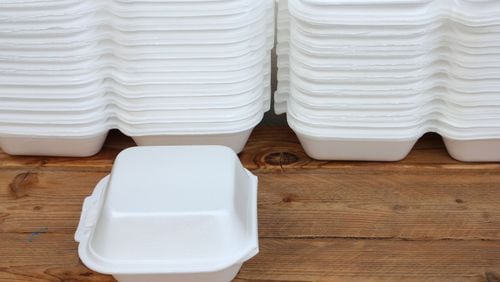Correction: This story has been updated to reflect the language of the bill which did not mention a particular brand of foam products.
A new bill that targets foam takeout containers, bans single-use plastic bags and charges a fee for the use of paper bags has been introduced in the senate.
This week, Sen. Sally Harrell (D-Atlanta), said Senate bill 434 was fueled by her young constituents.
“In this case, it was three constituents all under the age of 18,” said Harrell in a statement. “We not only need to do this to clean up Georgia’s landfills, beaches, and waterways and to protect our wildlife, we need to do this for the next generation who are now seeing the very real effects of climate change.”
The bill would ban the use of food service takeout boxes made of disposable polystyrene. It would exempt certain types of polystyrene packaging including that used for raw foods and eggs.
In addition to takeout containers, the bill also includes a ban on single-use plastic bags and adds a fee that would be retained by the retailer to cover the cost of supplying paper bags to customers.
Earlier this month, another senate bill sponsored by state Sen. Donzella James, D-Atlanta, also targeted single-use plastic bags.
Senate bill 280 would apply to carryout plastic bags provided by retailers. Bags used for bulk foods or uncooked meat, those containing newspapers, garment bags, bags used for food carryout orders or provided by a pharmacy for prescription drugs would be exempt from the ban. The bill was presented in a senate hearing but is not likely to receive a vote according to committee chairman, Sen. Frank Ginn, R-Danielsville.
>> Read More: Georgia senator proposes plastic bag ban
Polystyrene is found in everything from egg cartons to packing peanuts. About 99% of polystyrene ends up in landfills or dumps, according to the Centre for Synthesis and Chemical Biology. It can take thousands of years for polystyrene to decompose because of it’s strength and chemical makeup. During that time, it may release toxins or carcinogens into the environment, according to the Georgia Recycling Coalition.
Though a large amount of polystyrene waste is created annually, it is a challenging material to recycle in large part because of the cost. Coalition data shows it costs a recycling facility $3,320 per ton, or about 20-times more than most other materials, to recycle polystyrene.
Follow the progress of bills on The Atlanta Journal-Constitution’s exclusive Legislative Navigator







